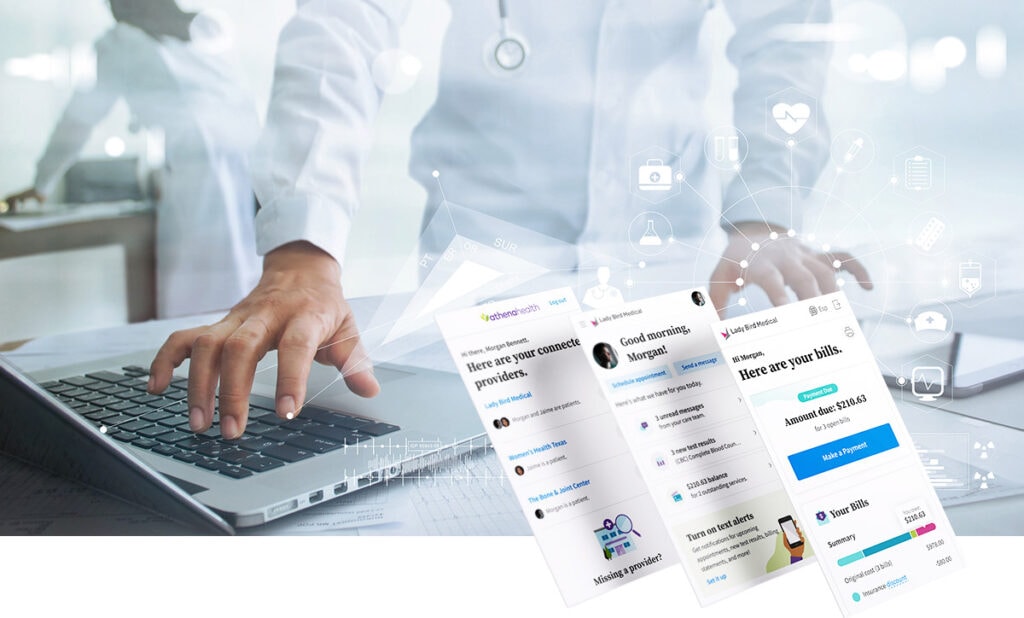AthenaHealth Practice Management Software Review
The AthenaOne Practice Management Software (PMS) by AthenaHealth encompasses an Electronic Health Records (EHR) system, billing features, and extensive healthcare practice management tools. This cloud-based platform is designed to enhance clinical workflows, boost practice efficiency, and facilitate superior patient care experiences.
Recognized as a leading choice for healthcare professionals, AthenaOne excels in delivering efficient front desk operations and patient management. Its standout features include streamlined workflow processes, reduced paperwork, expedited claim processing, and patient engagement tools, all contributing to improved healthcare delivery.

AthenaOne’s system offers advanced quality reporting capabilities with unlimited filtering options, surpassing the ease of use of many other PMS.
Its range of features can transform your practice, providing access to contemporary scheduling, telehealth services, electronic prescribing, and front-office billing functionalities. Additionally, AthenaOne enables you to benchmark your Key Performance Indicators (KPIs) against similar practices within its extensive network, aiding in data-driven decision-making for practice improvement.
This review details the features to expect if you want to use AthenaHealth as your practice management software.
Key Features of AthenaHealth Practice Management Software
AthenaCollector (Billing & Practice Management)
AthenaOne’s billing solutions and practice management are one of the most essential features for medical practitioners. The platform facilitates efficient patient appointment scheduling, effective reminder systems, and simplified payment and claim processing.
AthenaCollector is designed to assist front desk staff and improve patient experience by automating administrative and billing activities. This feature gives staff comprehensive insights into appointment schedules and facilitates quicker patient data handling.

Rather than calling the front desk, patients can schedule their visits online while phone calls, emails, and SMS reminders minimize no-shows by keeping the patient informed about their appointments.
With AthenaOne, handling billing and claims becomes more efficient. Although it’s essential to have a billing specialist, this system streamlines patient eligibility checks and minimizes errors that could result in claim rejections or denials.
It keeps a constant check on patient transactions to ensure proper payment flow. The system offers a complete snapshot of your financial performance, significantly lightening your team’s workload in managing revenue cycles.
AthenaClinicals (Electronic Medical Records)
We found that the Interoperability tools help transmit patient records and data from one practitioner to another within or outside a practice.
Convenient Note-Taking Functionalities
AthenaClinicals’ note-taking tools are designed for efficiency, allowing medical practitioners to document patient information seamlessly at every stage of the healthcare journey.
This functionality not only streamlines the documentation process but also contributes to a more organized and comprehensive patient record. It aids in creating a more cohesive patient care plan, as all relevant information is readily available for review and analysis.
Collaborate with Multiple Practitioners
In addition to displaying relevant information such as patient allergies, medical history, frequency of visits, illnesses, vitals, and other data that can help make informed clinical decisions, AthenaClinicals also allows practitioners to collaborate and add their diagnoses when attending to patients. This helps reduce the need for paperwork filings or inefficient communication.
AthenaCommunicator (Patient Engagement)
Mobile Application
The AthenaHealth platform has Health Apps for patients and practitioners and a patient portal for providers, staff, and patients to communicate seamlessly on one application. These apps are available on the Google play store for Androids, the Apple Store for iPhones and Ipads, and PC App for desktops and laptops.
SMS Integration
AthenaOne’s messaging functionality takes patient confidentiality to the next level with HIPAA-compliant encryption, facilitating protected and smooth communication between patients and their healthcare providers.
Telehealth
AthenaOne’s Telehealth feature is designed to bridge the gap between patients and healthcare providers, offering a convenient alternative to in-person visits through cloud-based health information technology (HIT) and end-to-end secured one-on-one video interaction tools on the platform without needing an extra application.
Patients can easily book and attend virtual appointments, receiving quality care from the comfort of their homes. AthenaOne’s TeleHealth also integrates with popular platforms like Zoom, revolutionizing remote healthcare. This integration ensures a familiar and reliable video conferencing experience for both patients and practitioners. The feature not only facilitates virtual consultations but also includes screen sharing and recording capabilities, enhancing the quality of remote medical interactions.
Beyond its Zoom integration, AthenaOne’s Telehealth offers a suite of tools designed for a comprehensive telemedicine experience. Features like real-time chat, file sharing, and customizable patient intake forms make each virtual visit as thorough as an in-person appointment. This seamless blend of telecommunication and medical record access empowers practitioners to deliver high-quality care remotely.
Integrations
AthenaOne provides users with three distinct Application Programming Interface(API)options tailored to meet diverse development and functionality requirements. These include support for HL7® and FHIR® (Fast Healthcare Interoperability Resources) standard integrations, as well as Certified FHIR API endpoints. Additionally, AthenaOne offers proprietary APIs, ensuring seamless connections and enabling users to leverage the platform’s full capabilities with ease.
AthenaOne also utilizes SMART on FHIR to enhance its interoperability and functionality further. With compliance with the 21st Century Cures Act, users of athenaClinicals, athenaCommunicator, and athenaClinicals for Hospitals & Health Systems benefit from expanded support, updated OAuth services, and improved patient consent workflows, reinforcing AthenaOne’s dedication to driving innovation and streamlining workflows in healthcare technology.
| Integrations | Benefits |
| HL7® and FHIR® Standard Integrations Support | AthenaOne supports integration with both HL7® and FHIR® standards, facilitating smooth communication and data exchange across various healthcare systems and applications. HL7® is a well-established framework for electronic health information exchange, while FHIR® is a newer standard known for its ease of implementation and interoperability. With support for both standards, AthenaOne ensures seamless interoperability, enabling efficient data sharing and collaboration in healthcare settings. |
| Certified FHIR API Endpoints | AthenaOne’s FHIR API endpoints are certified to meet industry standards, ensuring compliance with regulations and interoperability requirements. This certification signifies that AthenaOne’s APIs adhere to the specifications defined by the FHIR standard, providing users with confidence in the reliability and compatibility of the integration. |
| Proprietary APIs for Seamless Connections | In addition to supporting industry standards like HL7® and FHIR®, AthenaOne offers its proprietary APIs. These APIs are designed and developed internally by AthenaOne’s team to facilitate seamless connections and interactions within the AthenaOne ecosystem. By leveraging proprietary APIs, users can access advanced functionalities and features tailored to AthenaOne’s platform, further enhancing the integration experience and maximizing the platform’s capabilities. |
Current users of AthenaOne, AthenaClinicals, AthenaCollector, and AthenaOne for Hospitals and Health Systems have access to the Certified APIs through the Developer Portal, which can help build or integrate your software tools and applications.
AthenaOne also has some optional-use integrations such as the athenaCapture app for capturing and uploading images, Ingenico for handling the complete credit card payment ecosystem, NextPatient for extended online booking functionality, Rivia Health for billings, and DocResponse for digital check-in and clinical documentation.
Benefits of Using AthenaHealth Practice Management Software
AthenaOne offers several significant advantages, some of which set it apart from other PMS software. It combines essential features that assist with administrative and patient experience workflows. The benefits you can derive from these features include the following.
- Mobile functionalities for scheduling, e-prescription, and messaging
- Better operational efficiency
- Improvements in patient engagement
- Online scheduling with reminders for fewer no-shows
- Effective billing and claim management
Industry Capabilities
The AthenaHealth practice management software is ideal for healthcare practices of all sizes and specialties. It also supports various integrations that help improve its functionalities and performance.
AthenaHealth Pricing
AthenaOne PMS promises to help reduce the cost of running healthcare practices with zero hidden charges. The platform offers two payment models; encounter-based and percentage-based pricing.On the percentage-based pricing, medicare providers pay a certain percentage of their practice earnings to AthenaOne. Percentages are usually calculated based on the volume of patients received, the value of claims processed, and the complexity of your billing cycle, among other variables.The pricing per encounter is a collection-based model in which the software only charges for the number of appointments received periodically. This means that if your volume of appointments dips, your PMS fees will also reduce, allowing you to maintain equivalent cash flow. The AthenaOne team also offers a customized quote tailored to the number of practitioners and other specific practice needs. The EHR system is priced on a per-physician, per-month basis, with annual billing. Additional administrative accounts can be included as needed. The starting price for the basic plan is $140 monthly. For a practice comprising five physicians, the monthly fee would be a minimum of $700 or at least $8,400 on an annual basis. The first year also incurs a one-time expense of $1,000 for the migration of roughly 1,000 patient records and comprehensive staff training, bringing the initial year to around $9,400.
In Conclusion
Although AthenaHealth practice management software may be considered confusing to use, one good news is that they provide tutorial videos on how practitioners can effectively use the system for their specific roles. One major drawback is that the billing system requires you to have a billing staff to manage it, unlike other PMS that eliminate the need for staffing.
Overall, AthenaHealth has all the features healthcare practices need to operate efficiently. It is the ideal software for small and large practices that want to leverage its collection or encounter-based pricing system to save on software costs.
